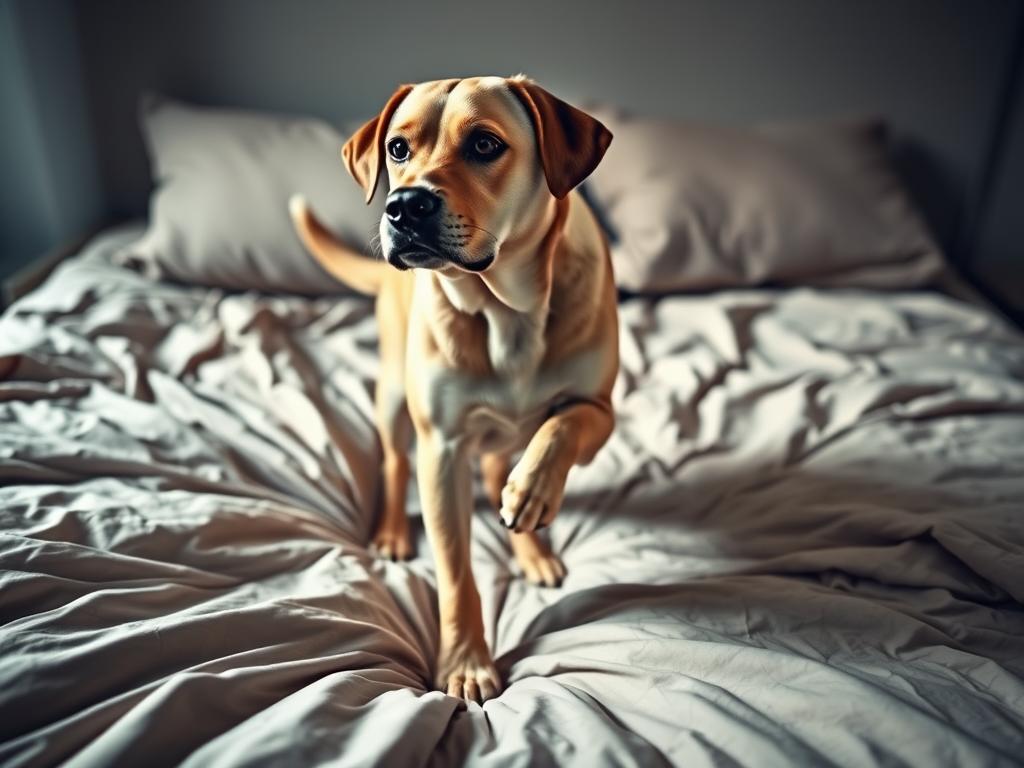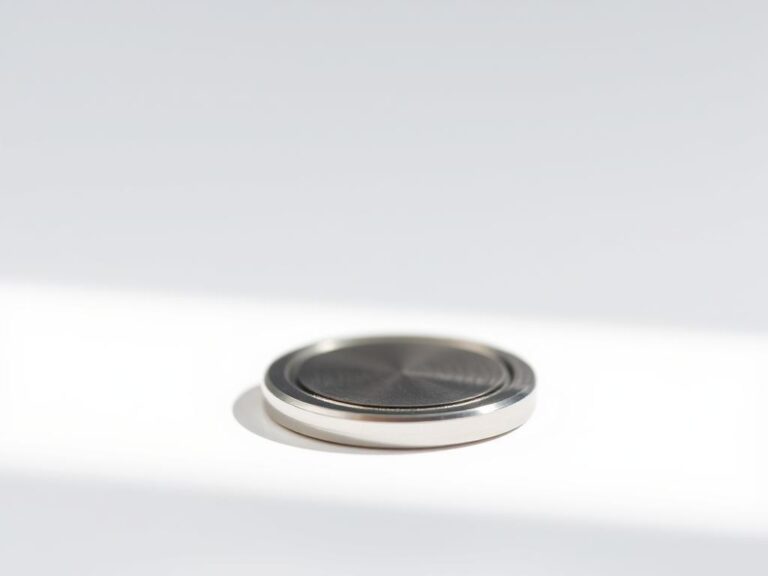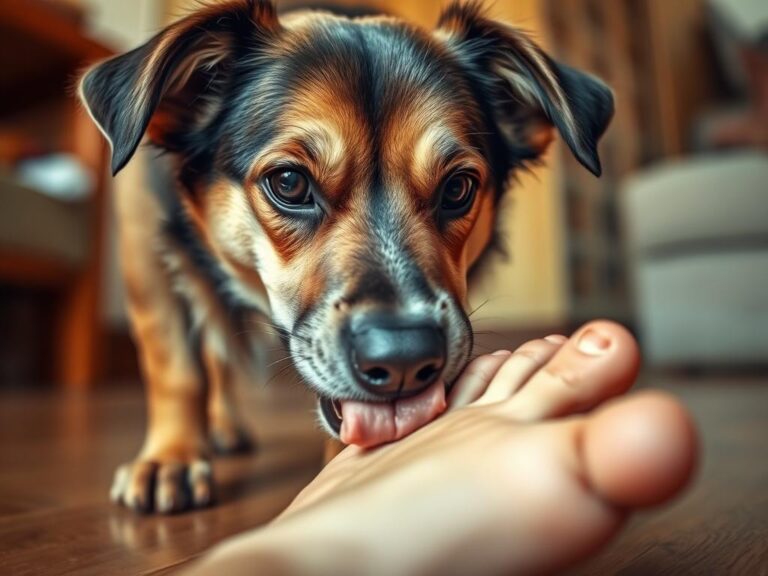Why Does My Dog Pee on My Bed?
Discovering that your dog has urinated on your bed can be frustrating and puzzling. This behavior is not only inconvenient but also raises concerns about your dog’s health and your home’s cleanliness.
It’s a common issue many dog owners face, and understanding the reasons behind it is crucial. Various factors could contribute to this behavior, ranging from medical issues to anxiety or marking territory.
Addressing this problem requires patience, observation, and sometimes professional help. By exploring the underlying causes, you can take the first step towards resolving the issue and restoring peace to your home.
Understanding Why Dogs Urinate in Inappropriate Places
The behavior of urinating in inappropriate places can be attributed to various factors, including natural canine instincts and the significance of certain locations to dogs. Dogs communicate in various ways, and urination is one of the primary methods they use to convey messages.
Natural Canine Marking Behavior
Dogs have an innate instinct to mark their territory through urination. This behavior is rooted in their wild ancestors, who used urine marking to define their territory and establish a sense of security and identity. As Dr. Ian Dunbar, a renowned veterinarian, notes, “Dogs use urine marking to communicate with other dogs, signaling their presence, status, and identity.”
Even in domestic settings, dogs retain this instinct, and they may choose to urinate on items that they perceive as significant or central to their environment, such as their owner’s bed.
The Significance of Your Bed to Your Dog
To dogs, their owner’s bed is often a place of comfort, security, and intimacy. Dogs are pack animals and view their human family as part of their pack. The bed, being a place where their pack members rest, becomes a significant location for them. As such, a dog may choose to urinate on the bed as a way of claiming ownership or marking their pack’s territory.
Moreover, dogs have a strong sense of smell and can be attracted to the scent of their owners on the bed, which may encourage them to urinate there. “Dogs are highly sensitive to smells and can detect pheromones in urine, which play a crucial role in their marking behavior,” according to a study on canine behavior.
Understanding these aspects of canine behavior can help dog owners address the issue of their dog urinating on their bed. By recognizing the underlying reasons, owners can take appropriate measures to prevent such behavior.
Why Does My Dog Pee on My Bed? Common Causes
Understanding why your dog chooses to pee on your bed involves exploring both behavioral and medical reasons. This behavior, while frustrating for dog owners, can often be traced back to a variety of underlying causes that need to be addressed appropriately.
Behavioral Reasons
Several behavioral factors can contribute to a dog peeing on its owner’s bed. These include anxiety, stress, territorial marking, and attention-seeking behavior.
Anxiety and Stress
Dogs, like humans, can suffer from anxiety and stress, which can manifest in various behaviors, including inappropriate urination. Changes in the environment, new pets, or even a change in the owner’s work schedule can trigger such anxiety.
Territorial Marking
Territorial marking is another common reason. Dogs have scent glands in their urine, and by peeing on their owner’s bed, they may be marking their territory, claiming ownership, and signaling to other animals.
Attention-Seeking Behavior
Some dogs may urinate on their owner’s bed as an attention-seeking behavior. If a dog notices that this action elicits a reaction from the owner, whether it’s positive or negative, they may continue this behavior to garner attention.
Medical Issues That May Be Responsible
Besides behavioral reasons, several medical issues can cause a dog to pee on its owner’s bed. These include urinary tract infections, incontinence problems, and age-related factors.
Urinary Tract Infections
Urinary tract infections (UTIs) are a common medical issue that can cause dogs to urinate more frequently or in inappropriate locations. UTIs can be painful and need veterinary attention.
Incontinence Problems
Incontinence can affect dogs, especially as they age. It can result from various factors, including weakened bladder muscles or neurological issues, leading to accidents in the house, including on the owner’s bed.
Age-Related Factors
As dogs age, they may experience a decline in physical capabilities, including bladder control. Older dogs may not be able to hold their urine as well as they once could, leading to accidents.
| Cause | Description | Potential Solution |
|---|---|---|
| Anxiety and Stress | Dogs may urinate due to changes in their environment or emotional state. | Provide a calm environment, consider behavioral training. |
| Territorial Marking | Dogs mark their territory by urinating on significant items. | Spay or neuter, limit access to the bed. |
| Urinary Tract Infections | Medical condition causing frequent or inappropriate urination. | Veterinary diagnosis and treatment. |
| Incontinence | Loss of bladder control, often age-related. | Consult a veterinarian for management options. |
How to Stop Your Dog from Peeing on Your Bed
If your dog is peeing on your bed, it’s essential to act quickly to prevent this from becoming a persistent problem.
First, it’s crucial to remain calm and not scold or punish your dog for urinating on your bed, as this can create anxiety and make the problem worse.
Immediate Actions to Take
When you catch your dog in the act of peeing on your bed, interrupt the behavior by calmly saying “no” and immediately taking them to the designated bathroom area. Reward your dog with treats and praise when they finish their business in the correct location.
- Supervise your dog closely to prevent future incidents.
- Limit your dog’s access to your bedroom until the issue is resolved.
- Increase the frequency of bathroom breaks, especially for older dogs or those with medical issues.
Properly Cleaning Urine Stains and Odors
To prevent your dog from being drawn back to the same spot, it’s vital to thoroughly clean the area where they urinated. Use a cleaner specifically designed to remove pet urine odors, as these products break down the uric acid crystals that cause the smell.
When to Consult a Veterinarian
If your dog continues to pee on your bed despite your best efforts to correct the behavior, it may be necessary to consult with a veterinarian to rule out underlying medical issues. Certain health problems, such as urinary tract infections or kidney stones, can cause dogs to urinate in inappropriate places.
- Schedule a vet visit if you notice other symptoms like blood in the urine or increased frequency of urination.
- Discuss your dog’s behavior with your veterinarian to determine if there’s a medical cause.
- Follow your veterinarian’s recommendations for diagnostic tests or treatments.
By taking these steps, you can address the issue of your dog peeing on your bed and work towards a solution that benefits both you and your pet.
Training Techniques to Correct Inappropriate Urination
Effective dog training is pivotal in correcting the habit of peeing on the bed, and it starts with choosing the right techniques. Training your dog requires a comprehensive approach that includes understanding their behavior, being consistent, and using positive reinforcement.
Positive Reinforcement Methods
Positive reinforcement is a powerful training tool. By rewarding desired behaviors, such as urinating outside or in a designated area, you encourage your dog to repeat those actions. Rewards can be in the form of treats, praise, or playtime, making the training process a positive experience for your dog.
Crate Training Benefits and Methods
Crate training is another effective method for housetraining dogs. It works by utilizing a dog’s natural instinct to keep its sleeping area clean. By confining your dog to a crate when you’re not home to supervise, you can prevent accidents and speed up the learning process. The crate should be introduced gradually, and its size should be appropriate for your dog.
Establishing a Consistent Bathroom Schedule
A consistent bathroom schedule helps your dog learn when it’s time to go outside. Take your dog to the same spot each time to create a routine. Immediately after meals, naps, and playtime are typically good times to take your dog outside. Consistency and patience are key to developing good bathroom habits.
As
“Consistency is key when training a dog. By establishing clear rules and consequences, you can help your dog understand what is expected of them.”
, says dog training experts. By combining these training techniques, you can effectively correct your dog’s inappropriate urination habits.
Resolving the Issue of Dogs Peeing on the Bed
Understanding why your dog pees on your bed is crucial to finding a solution to this frustrating problem. As discussed, the reasons can range from behavioral issues to underlying medical conditions. Identifying the root cause is the first step towards resolving the issue.
Effective solutions to dog peeing on bed involve a combination of proper training, patience, and, if necessary, veterinary intervention. By applying positive reinforcement methods, establishing a consistent bathroom schedule, and addressing any medical issues, you can help your dog learn to urinate in appropriate areas.
It’s essential to approach this issue with empathy and understanding, recognizing that your dog’s behavior is not a result of spite or disobedience. With the right approach and support, you can overcome this challenge and strengthen your bond with your dog. By implementing the strategies outlined, you’ll be well on your way to finding a solution to why your dog pees on your bed.






